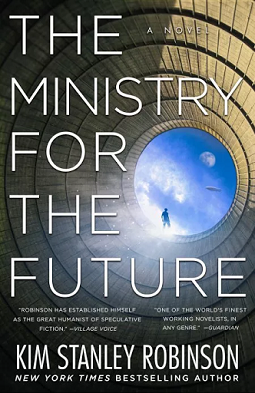I did like the book but I also thought they solved huge problems in a single short chapter with minimal detail.
In one chapter it’s mentioned that one of the characters is working on some open source social media. A few chapters later it becomes the dominant social media in the world… oh and also payment method… Oh and blockchain…
Being a big fan of Lemmy, I think the book is a bit optimistic.
I thought that it wasn’t handwaved away so much as discussed as being developed by a particularly skilled group as part of promoting a populist freedom oriented crypto, and funded internationally over years by the Ministry but as a minor project that blew up due to network effects kicking.
In that respect I thought it was realistic and while background to the main plot and characters, included as one of the better solutions that together all add up. I didn’t mind it as reference rather than story, but thought “that would be an interesting story in its own right” and since KSR is not a software dweeb and typically doesn’t go there, I would rather read a version by Stross or N. Stephenson.
The Three Body Problem also had a habit of coming up with really interesting concepts, which could have themselves been entire books, then dropping them after a chapter or two.
For example the device that could make anyone truly believe anything. They never got too techy about how it worked but after a chapter or two you really felt like you had explored some implications of such a technology on society.
I guess it’s a bit much to ask a book about climate disaster to provide detailed insight into what the future may hold for Lemmy.
KSR is probably my favorite living author.
I think the book is supposed to be more “this is what is possible” than an actual roadmap.
His optimism is what I really like about his work; anyone can throw up their hands and give up, but that’s a dereliction of duty. Believing that a better world is possible and worth fighting for is the point, in my opinion.
I’ll have to read more of their stuff. Which of their books is your favorite?
My favorite is probably Aurora, in which a generation ship makes a voyage to Tau Ceti to set up a colony.
After that, I really enjoyed Galeleo’s Dream, a time-travel story about the famous polymath and a plot to reshape the history of scientific thought.
And Shaman is also great: it’s about the paleolithic people who painted the chauvet cave and their struggle to thrive in an impossibly harsh time.
And finally I also just finished The Years of Rice and Salt recently, and it’s one that I know I’ll have to re-read sometime. It’s an alternate history about how the world would shake out if the population of Europe was wiped out by a plague in the 1400s and follows a set of characters reincarnating over the centuries.
Sweet! Thank you!
I love Kim Stanley Robinson, but yeah, he is definitely handwaving past a lot of the feasibility and hard work involved in many of the solutions presented. He is just a writer throwing out ideas more than working thru the struggles of implementing and getting adoption of those ideas.
To be fair, he focuses on some struggles more than others. In Ministry it’s more about a few activists and one relevant bureaucrat organizing from top down and bottom up, and not really about labourers other than vignettes for context. Character development over plot for KSR, usually.
That’s very fair.



